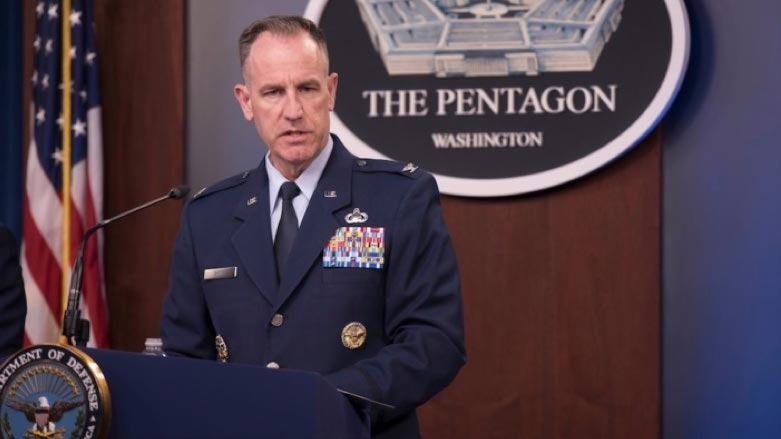US, Turkey reiterate opposing positions on cross-border military operation

WASHINGTON DC, United States (Kurdistan24) On Thursday, the US and Turkey repeated their well-established positions about a Turkish military operation across-its southern border. Washington warned, again, against such a move, while Ankara asserted its right to take any action it deems necessary for its self-defense.
The articulation of the contradictory positions followed a day after US Secretary of Defense Lloyd Austin spoke with his Turkish counterpart, Hulusi Akar, and expressed the Pentagon’s “strong opposition to a new Turkish military operation in Syria.”
Read More: US defense chief urges Turkey not to launch Syria op
US influence over Turkey’s decision-making appears limited, it seems, and the basic reason is the Ukraine war. That conflict has given Ankara a key role in a major international confrontation, increasing its leverage with both Washington and Moscow.
Turkey claims that the Kurdistan Workers’ Party (PKK) was behind the Nov. 13 bombing in Istanbul that killed six people, thereby justifying a cross-border offensive. But that appears unlikely, and it seems more likely that ISIS was responsible for the bombing.
US Reiterates Opposition to Turkish Cross-Border Assault
Pentagon Press Secretary, Brig. Gen. Patrick Ryder, briefing journalists on Thursday, underscored Austin’s message to Akar on Wednesday, when the Secretary of Defense “relayed the Department’s strong opposition to any potential ground invasion in Northern Syria.”
“The focus here,” Ryder continued, “is on enabling and ensuring that the Defeat-ISIS mission can continue unimpeded and to prevent potential instability in that region.”
On Tuesday, Ryder explained that US forces had reduced their patrols in Syria, because they are conducted jointly with the Kurdish-led Syrian Democratic Forces (SDF.) The SDF is the anti-ISIS Coalition’s main partner in Syria, but it is now threatened by Turkish attack.
On Thursday, Ryder confirmed that the patrols continued at a reduced rate, but they were ongoing, and the US remained committed to its anti-ISIS mission, along with its partnership with the SDF.
Turkey Defiantly Affirms Right of Self-Defense
Separately, and also on Thursday, Turkey’s National Security Council convened for three hours in a meeting that was chaired by President Recep Tayyip Erdogan.
Following the lengthy meeting, the Council issued a defiant statement. “The existence and activity of any terrorist group will not be allowed in our region, and every necessary step will be taken decisively for this.”
For his part, the Turkish Defense Minister used similar language, as he addressed reporters on Thursday.
“In the recent talks with allied countries, necessary warning and reminders were made to them about not supporting the PKK/KCK/YPG, a bloody terrorist organization that attacks our borders and our people, for whatever reason, including the pretext of fighting Daesh/ISIS,” Akar said.
He denounced as “unacceptable,” what he called “the attitudes of those who perceive the Daesh/ISIS terrorist organization as a danger from thousands of kilometers away about our necessary measures against terrorist organizations.”
Whether Akar spoke like that to Austin is unknowable. Certainly, nothing in the US read-out of their discussion conveyed that impression.
Ukraine War Gives Turkey Leverage and Room for Maneuver
Turkey is playing a central role in the Ukraine war in two respects. It maintains working relations with both Ukraine and Russia and was closely involved, along with the UN, in negotiating the understanding that has allowed Ukraine to export grain from its Black Sea ports.
Ukraine is a major grain producer, providing some 10% of the world’s wheat and 15% of its corn. If Ukraine’s exports had remained blocked, it not only would have hurt Ukraine and its farmers, but all the countries that import grain from Ukraine. Indeed, it would have hurt consumers around the world, as halting Ukraine’s exports would have led to major price increases.
Turkey is also important as a NATO member. Historically, Finland and Sweden have been neutral countries—neither part of a pro-US alliance or a pro-Russian one.
However, Moscow’s brutal, unprovoked assault on Ukraine has shocked them, and both countries have applied for NATO membership. But for a country to become a NATO member, all existing NATO members must approve.
Thus, Turkey’s acquiescence is necessary, if Finland and Sweden are to join NATO. Although both countries have sought to conciliate Turkey in its complaint that they are too friendly to the PKK, Ankara has yet to approve NATO membership for either of them.
Thus, Washington hesitates to take a stand that would alienate Turkey, and Erdogan takes full advantage.
More Reason to Doubt PKK Behind Istanbul Bombing
On Thursday, Kurdistan 24 discussed with an informed Kurdish source why ISIS seemed the most likely party responsible for the Nov. 13 bombing in Istanbul that killed six people.
That conclusion was based, primarily, on two points. One was CENTCOM’s revelation that a Turkish-backed group in Syria had assassinated ISIS’s leader a month before the bombing. The other was that the woman who planted the bomb does not look Syrian—neither Arab nor Kurdish—despite Ankara’s claim that she is, indeed, Syrian.
Read More: US: Turkish-backed group killed head of ISIS last month—throws new light on Istanbul bombing
This Kurdish source readily agreed and added another point. “If the PKK were to act on the mistaken view that the terrorist bombing of a street in Turkey was a good idea (and he did not think it had), the PKK would not carry out such an attack in Istanbul” he said.
Istanbul is an international city, he noted, where the pro-Kurdish People’s Democratic Party (HDP), “has a significant presence,” including the city’s mayor. Rather, the PKK would, instead, have targeted Turkey’s political capital—i.e. Ankara—he stated.
